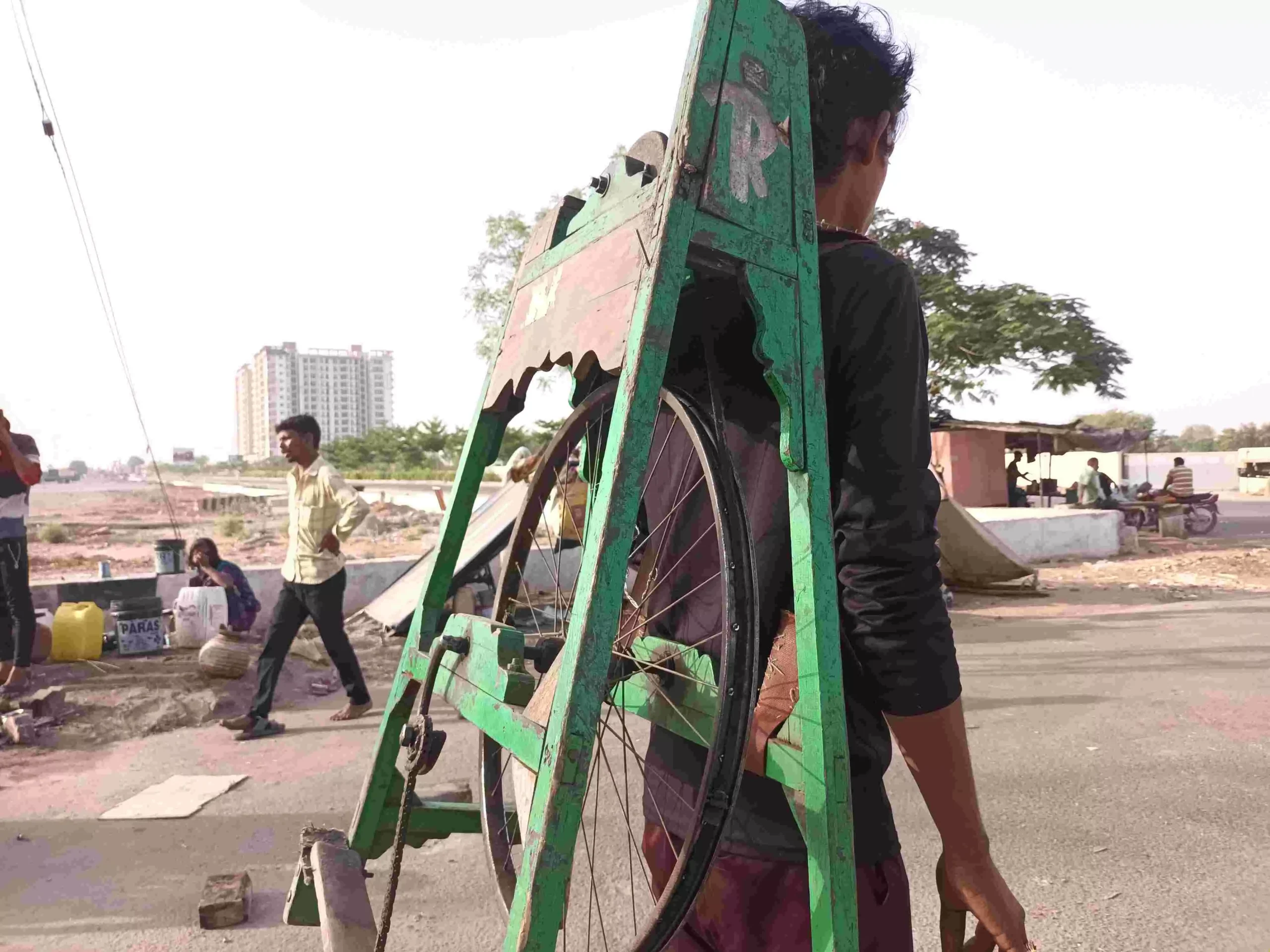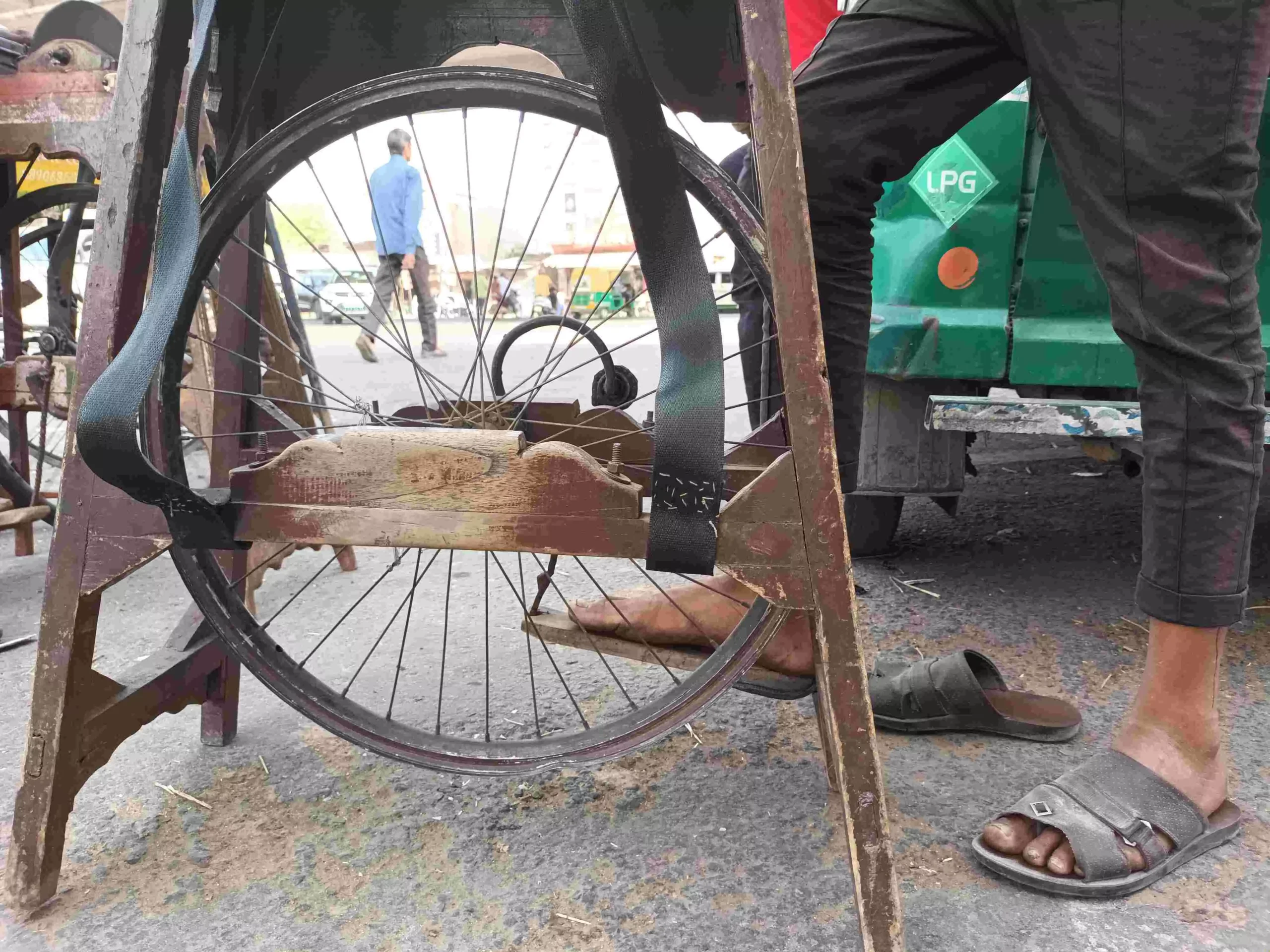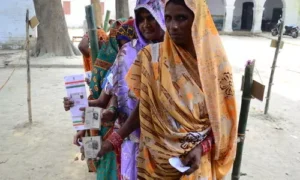Jaipur, Rajasthan
On the highway in Jaipur, that leads to Ajmer, is a cluster of huts. Outside most of them stand contraptions essentially made up of a wooden structure framing a cycle tyre and a flint stone. These are knife sharpeners, a source of livelihood for the people in the huts.
In one of the huts lives 12-year-old Rahul along with his father, a daily wage labourer, and his mother who weaves bamboo baskets. Rahul belongs to the Sikligar community of blacksmiths who wander the streets of Jaipur sharpening knives, scissors and farm implements. The community claims to have made weapons for the army of Guru Tegh Bahadur, and kept them sharp and in fighting order.
Every morning at about 8 am, Rahul sets out to work after a hasty breakfast of leftover rotis soaked in buttermilk. He hitches the wooden contraption that weighs nearly 20 kilograms on his back and heads out in the blistering heat. Some days he walks about 10 kilometres with that weight on his back hoping someone somewhere will require his services. If he is lucky, there are days he will return home having made Rs 150.

Every morning Rahul hitches the wooden contraption that weighs nearly 20 kilograms on his back and heads out in the blistering heat.
“I don’t plan my route ahead. I reach the bus stand and whichever bus is there I get into it,” Rahul told Gaon Connection. “I get off wherever my heart desires,” he added. But, there are days, he has no money for a ticket so he walks the entire distance. “I walk up and down streets in Jaipur inviting people to get their knives sharpened…” he trailed off.
Like Rahul, 15-year-old Raju of the Sikligar community has been sharpening knives for the past seven years. He has never been to school. “We are labourers. I do not even know how to get into a school. I would like to study and do something better, but no one in my community studies,” he told Gaon Connection.
“The Sikligars claim that they were the ones who made and repaired weapons for the army of Maharana Pratap,” Gopal Singh Keshawat, former head of the nomadic welfare board, Rajasthan, told Gaon Connection. According to a census carried out in 1891, Sikaligars are also known as Maru in Mewar region of Rajasthan. But the state has no data available on them currently.
Interestingly, in the states of Rajasthan, Gujarat, Telangana and Andhra Pradesh, the Sikligars follow the Hindu faith while in Punjab they are Sikhs. In Rajasthan they are classified as nomadic.
No education, no access to basic amenities
“It is so sad that the Sikligar children who should be with books, pencils and toys are instead lugging their heavy burden, sharpening knives and scissors,” Varun Sharma, programme director with Jaipur-based Association for Rural Advancement through Voluntary Action and Local Involvement (ARAVALI), told Gaon Connection.
Not having access to education is flouting the fundamental rights of these children, he added. Article 21A and Article 45 in the Constitution stipulates that it is compulsory that children between six and 14-years-of age should be educated free of cost. “But, hundreds of children in the Sikligar community continue to be deprived of any kind of schooling,” Sharma said.
According to him, these children do not fall within the purview of any NGO nor any government scheme. “It is of utmost importance that before anything else Sikligar children should have some identity and they should be made beneficiaries of a government programme,” said Sharma.
Education aside, the Sikligar community living at the outskirts of Jaipur does not even have access to drinking water or sanitation. “We have to ask for drinking water from a neighbouring building. We have no bathrooms. Yet, we are forced to live here as we have nowhere else to go and we have to eat, isn’t it,” asked Naina, a 25-year-old who lives in a hut close to Rahul’s.
There is a huge health cost attached too. “These children are completely cut off from childhood. When their bodies and brain should be developing, they are being overworked and are involved in the dangerous task of sharpening knives,” said Ashok Gupta, paediatrician at JK Lone Hospital in Jaipur. “This leaves the children stunted both physically and mentally. Such hard labour at such a young age affects their psyche too,” Gupta told Gaon Connection.
No repair, no reuse means no livelihood
There is worse for this community as even their meagre source of livelihood is in danger of drying up completely. “No one repairs or reuses anymore. Anything that does not work well enough is thrown out and replaced by a new thing, including old knives. No one wants to sharpen old knives, they just get new ones,” Jothram, who has been sharpening knives since childhood, told Gaon Connection.
“Just like television replaced dance, drama and live music, easily available knives in the market are rendering us irrelevant,” he shrugged.
Social worker Ashwini Kabir, based in Jaipur, who works with nomadic tribes was acerbic when he blamed politics for the condition of the Sikligars. “No government has had a vision or plan for nomadic communities. Nomadic communities live simple lifestyles relying on their skills to survive. Instead of using their traditional skills to develop them and bring them on the path of progress, the governments continue to ignore them. The governments are ignorant of their very existence, and there is no data available on them,” he told Gaon Connection.

There is worse for this community as even their meagre source of livelihood is in danger of drying up completely.
Gaon Connection made several calls to Samit Sharma, Secretary, Social Justice department, to find out if there was any welfare work underway for the Sikligar community, but he did not respond to the calls.
According to Madan Meena, honorary director, The Adivasi Academy in Tejgadh, Gujarat, “Historically, while the Sikiligars have had a prominent role to play in weaponry of kings, etc., today they live on footpaths struggling to survive.” According to him, after Independence, there were no more kings and kingdoms, and gradually the Sikiligars were marginalised.
“Demand for their work diminished. Today, they are economically and socially deprived and there is no documentation on how many of them are there in the community,” Meena said.
The story is part of a fellowship for Work: No Child Business (WNCB). Names of children in the story have been changed as per request.




















